The research we conduct at Niagara Health has a profound impact on the health and well-being of our patients and communities, and contributes to better understanding some of the most significant healthcare challenges of our time with the potential to benefit patients in Niagara and across Canada.
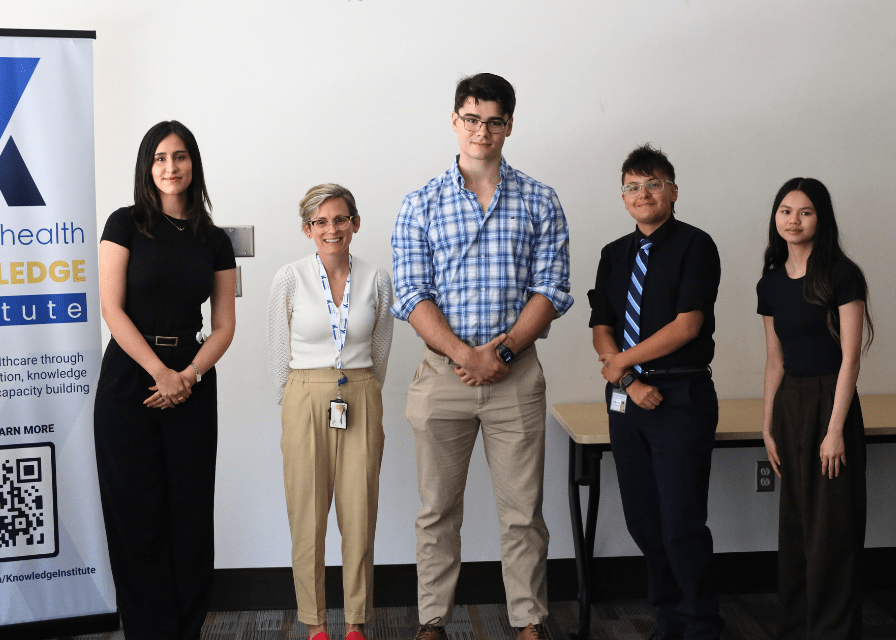
Student Ghazal Mohavedi, Elaina Orlando, Research Manager at NHKI and students Liam MacInnis, Sebastien Duguay and Grace D'Angelo
For four budding health researchers, a summer at Niagara Health’s Knowledge Institute (NHKI) offered more than just a glimpse into hospital research — it was a chance to tackle real-world projects that will help shape patient care in Niagara.
Through the Summer Student Research Scholarship program, the students advanced priority projects in areas from patient safety to sepsis research, building valuable skills while strengthening Niagara Health’s capacity to conduct research in a community hospital setting.
The NHKI recently welcomed partners, staff and guests to hear from this year’s research scholarship recipients, who presented the projects they’ve been working on during their placements.
The program, offered in partnership with Brock University, McMaster University’s Thrombosis and Atherosclerosis Research Institute (TaARI), Niagara College and the University of Niagara Falls Canada, provides students with hands-on research experience in a hospital setting while contributing to projects that can improve patient care.
“Their work this summer has advanced important research priorities for Niagara Health and strengthened our collective capacity for innovation in healthcare.”
“These placements give students the opportunity to contribute to meaningful, real-world projects while developing the skills and experience they need to excel in their future careers,” says Dr. Jennifer Tsang, NHKI Research Executive Director and Chief Scientist.
“Their work this summer has advanced important research priorities for Niagara Health and strengthened our collective capacity for innovation in healthcare.”
Each of the four students recently delivered a 15-minute presentation outlining their work and what they learned doing it.
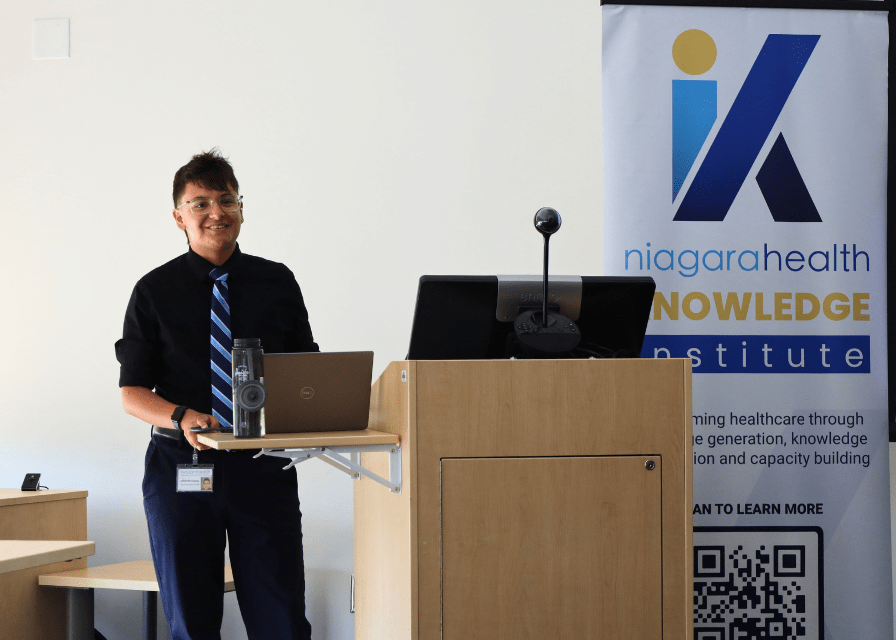
Sebastien Duguay, Niagara College student
Sebastien Duguay, a Niagara College student, focused on improving the documentation of hospital-acquired delirium in older adults as part of the provincial Delirium Aware Safer Healthcare (DASH) initiative.
Through extensive chart reviews, he uncovered significant gaps in delirium screening and recording, which can directly affect follow-up care.
“I had the opportunity to shadow members of the DASH and geriatrics teams and see first-hand how patient care and research intersect,” says Duguay.
“Watching the CAM tool used in real time and hearing directly from Patient Partners gave me a much deeper understanding of the importance of early detection.”
Liam MacInnis, a student at McMaster University/TaARI, supported both laboratory and clinical research on sepsis, the leading cause of ICU deaths worldwide.
He worked on animal models, patient sample bio-banking and lab tests, focusing on improving reproducing results and translating complex science into patient-friendly explanations.
“One of the main things I’ll take from this experience is how important it is to be careful and consistent in every step of research,” MacInnis says.
“Working alongside the team here has shown me how collaboration across hospitals and research institutes makes complex projects possible.”
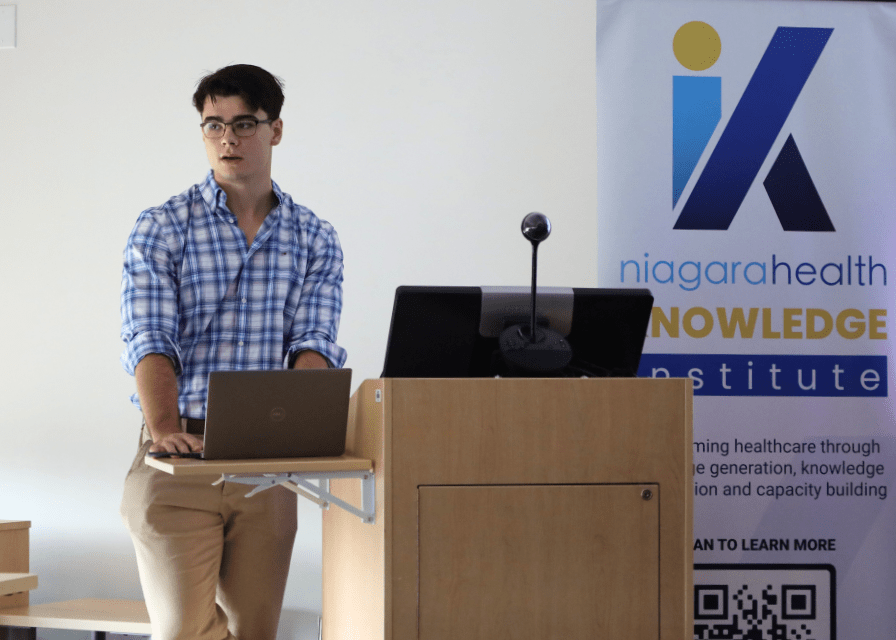
Liam MacInnis, McMaster University student
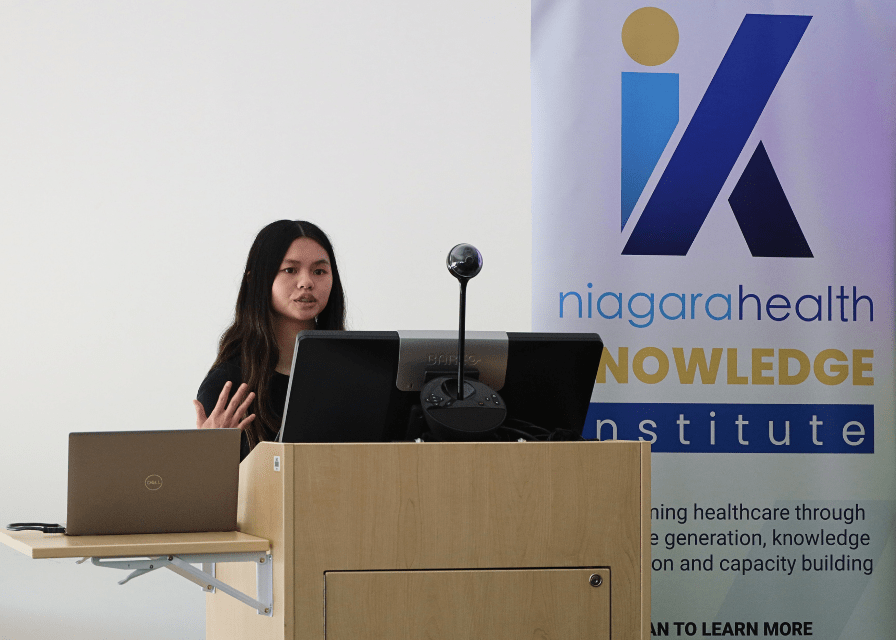
Grace D'Angelo, Brock University student
Grace D’Angelo, a student at Brock University, conducted a rapid review to define “health system capacity” for the Niagara Ontario Health Team’s long-term planning, and explored how community hospitals can build research capacity.
She learned how concepts from her public health training apply in real-world hospital research and how patient engagement can strengthen study design.
Her work will help inform local healthcare planning over the next decade and contribute to national discussions about equitable access to clinical research.
“Working in a hospital research environment allowed me to see how concepts from my public health degree are applied in real-world settings. It also deepened my understanding of how lived experience can shape more equitable healthcare solutions,” D’Angelo says.
Ghazal Mohavedi, a University of Niagara Falls Canada student, applied the national Hospital Harm Indicator to Niagara Health data to identify preventable harm events, such as infections, medication errors and falls, and explored these through an equity lens.
She learned how crucial accurate documentation and coding are for measuring patient safety, and how data can guide targeted interventions to reduce harm and improve outcomes for all patient groups.
“Even in just a few weeks, I’ve learned how much can be uncovered from hospital data and how important it is that it’s documented and coded properly,” Mohavedi says. “This experience has shown me how research can directly support safer patient care.”
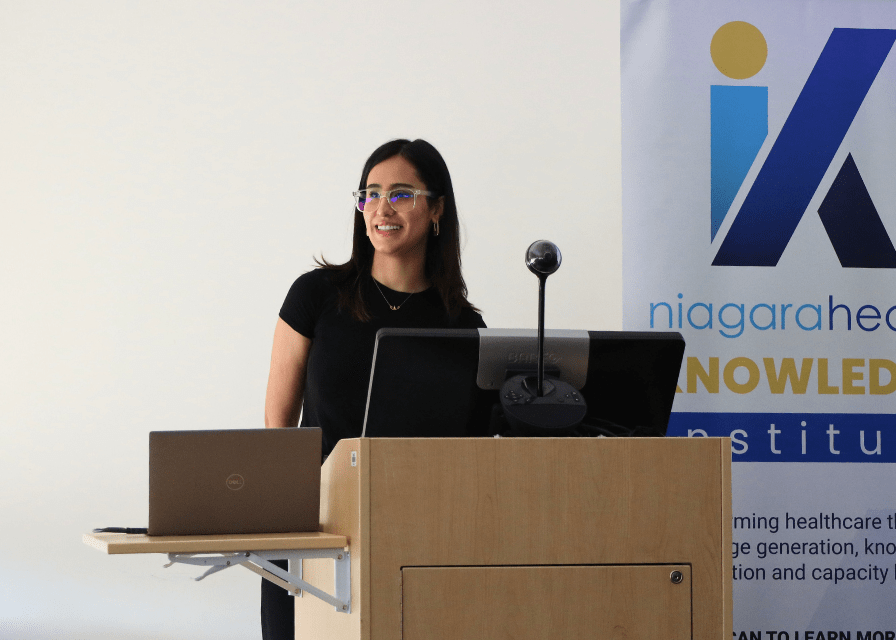
Ghazal Mohavedi, University of Niagara Falls student
Throughout their placements, the students worked closely with Niagara Health researchers and staff, gaining practical skills in research methods, data analysis, patient engagement and interprofessional collaboration.
Many also shadowed clinicians, attended committee meetings and contributed to other NHKI projects, building skills they can apply to future studies or clinical work.
Elaina Orlando, MPH, PhD, Research Manager at the NHKI, emphasized that this hands-on experience is made possible through strong partnerships.
“This program is the result of collaboration and a shared commitment to developing future healthcare leaders,” says Orlando.
“By working alongside our researchers and clinicians, students not only contribute to meaningful projects but also gain the confidence and skills to shape the future of healthcare.”

